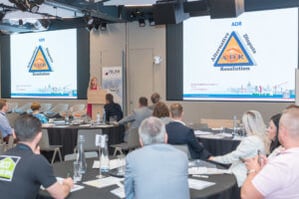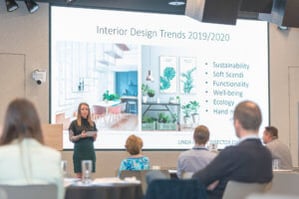The Third British-Polish Construction Forum took place on 24 May 2019 at the NatWest Conference Centre in the City of London. Organised by PBLINK, the event has become a regular fixture in the business calendar. Over 100 business owners from the sector – architects, interior designers, developers, contractors, sub-contractors and consultants – came from as far afield as Kraków, Rzeszow, Manchester, Leeds, Wigan and Scotland to network and to learn. Interestingly, what was once an event frequented almost exclusively by Polish entrepreneurs has now broadened out to include participants reflecting the diversity of the British business community.
Tshe event, supported by Carter Lemon Camerons, OneMoneyMail (trading as Sami Swoi) and the hosts NatWest, was opened by the Polish Ambassador to Britain, Arkady Rzegocki, who stressed the important contribution that Poles have played in the British construction sector over the decades.
“Why can’t we build better buildings?” was the theme of the first panel that opened the event, providing an overview of challenges facing the sector in the UK. The panel consisted of David Stapleton, co-founder of Copronet, Patrick Nicholson of Newable, Piotr Szykuła of Danwood House, Carl Boorer from Solid Management, Guy Pearson of Pearson Business Solutions and Piotr Świeboda from the Association of Polish Engineers in Great Britain, and was moderated by the British Polish Chamber of Commerce’s chief advisor, Michael Dembinski.

Three main threads emerged – technology – the sector is 30-50 years behind manufacturing or services in terms of adopting IT-based solutions; building contracts and the very nature of client-contractor relations which is confrontational; and finally access to a skilled and committed workforce.
The number of local house builders in the UK has contracted by 80% over the past decade, said Patrick Nicholson, blaming the concentration of scarce land in landbanks by the big-six housebuilding firms. Their scale makes them more competitive when it comes to attracting and training labour, something small firms can’t afford. Piotr Szykuła pointed out that while the self-build market for houses in Poland, Germany and Ireland is around 60%, in the UK, it is around 10%, with the big players dominating the market.
Check the blog post about Polish Builders in London.
How Polish in Construction can tender in the UK?
A big part of the discussion surrounded tenders and contracts. The adversarial nature of the construction sector was ascribed to a blame culture rather than operating on good will; the standard contracts (in particular the JCT suite) anticipate conflict and do not encourage win-win. The idea of sharing the gain (when a project is ahead of schedule and under budget) and the pain (when things go wrong) is an ideal to strive toward. Risk-averse developers and contractors are unwilling to adopt novel solutions, so with each passing decade, the entire sector falls further and further behind the rest of the economy.
Total cost of ownership, rather than lowest price should be the aim of tenders, considering the entire life-span of the building including its operation and maintenance. And while solutions such as BIM can improve the efficiency at the design stage, eliminating clashes and lowering actual building costs, the extra costs incurred before construction starts tends to put off many builders, especially the smaller ones. “We are 20 years from BIM,” said David Stapleton of Copronet.
The industry does not invest enough in the future. “The aerospace industry spends 6% of turnover on R&D and automotive 4%, whilst in construction it’s around 1%, said Guy Pearson. Profit margins are thin, so there’s little left for investment. Piotr Świeboda emphasised the role of sharing information across the project’s lifetime, and using the relevant tools available to do so. Technological change, such as 3D printing with concrete, translucent solar panels (a Polish invention) and increasing use of pre-fabricated units, made in factories rather than on-site, to higher tolerances, will all revolutionise construction – but not in the immediate future.

The situation is little better in people, although things are changing. The skills shortage means a greater emphasis on training, something mentioned in the Farmer Report on the construction sector, published two years ago. Entry-level pay is improving; a young person starting work in construction can earn up to three times more than in retail, said Carl Boorer, who emphasised the need to attract school-leavers to the industry by inspiring them with role models and emphasising the lasting legacy that builders leave.
Client management is an important and often-overlooked skill; honesty with clients pays dividends. Mr Boorer said that he tells clients that “he will screw up” – making clear that problems will occur. But such frankness is a part of expectation management.
The panel session was concluded with a questions from the floor, and followed by a roundtable session, where participants met on nine tables to discuss among themselves in greater detail with the aim of providing answers to the challenges raised by the panellists.
The session, moderated by Nick Howe, NatWest Business’s enterprise manager, summarised the findings, which looked at productivity and profitability, attracting talent and improving project performance.
Lunch was followed by four workshops

In the first, Kate Boguslawska, partner at Carter Lemon Camerons, looked at the crucial question for any business in the construction business – getting paid. Kate set out the alternatives for what to do when a project goes ‘pear shape’, outlining the most common reasons for construction disputes, and how to avoid them. Legal proceedings and alternative dispute resolution were discussed.
The second workshop, run by David Stapleton, co-founder of Copronet, focused on delivering projects on time and within budget, offering practical tips based on his 30-years’ experience in the UK construction industry. With 80% of projects ending up over budget or missing deadlines, David set out the best ways of getting it right.
Construction Workshop & Discussion Panel with Members
This was followed by a workshop focused on fit-out and design. Linda Rosen, director of Edge Design Studio, looked at the factors that are all too-often overlooked in construction, namely maximising profit via raised standards – quality craftsmanship, smart design and sustainability – rather than cost-cutting. In an interactive seminar, Ms Rosen showed examples of projects the exemplified ‘better building’.

The final workshop of the afternoon moved on from quality to quantity – how the UK can scale up its construction sector to meet the challenge of delivering the 340,000 new homes each year needed to satisfy the market. The population is growing, and housing is becoming less affordable. Building on such a scale will be a huge challenge to the UK construction sector. Guy Pearson of Pearson Business Solutions tackled the question of how this can be achieved – and how developers, architects, contractors or manufacturers can all benefit – if they are prepared to think to scale.
After the formal part of the event, the networking began, facilitated by a ‘pitch draw’, in which five business cards were drawn and their lucky owners had the chance to present their businesses to the rest of the participants. The networking continued in full force until late into the evening, with the party moving across the road to a local pub until last orders!


